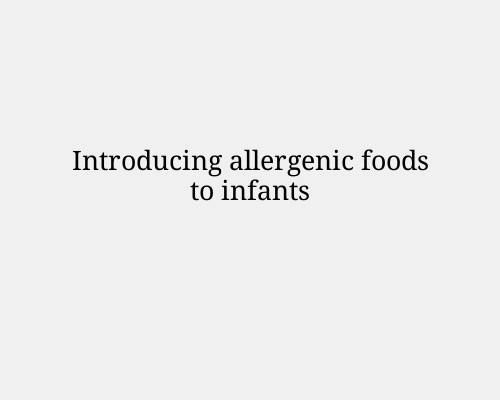
Introducing allergenic foods to infants has been one of the most discussed topics in paediatric nutrition over the last decade. Guidelines have shifted significantly as research has shown that delaying introduction may actually increase the risk of developing food allergies, rather than preventing them. Below is an overview of current recommendations and timing guidelines for introducing allergenic foods.
Why timing matters
Food allergies are most often triggered by early childhood exposure to allergens. In the past, parents were advised to delay introducing high-risk foods such as peanuts, eggs, or shellfish. However, large-scale studies (notably the LEAP and EAT trials) demonstrated that early, safe introduction of these foods can help build tolerance and reduce allergy risk.
Current timing guidelines
General age for introduction
Most guidelines recommend introducing allergenic foods around 6 months of age, alongside complementary feeding.
Do not introduce before 4 months, as infants are not developmentally ready for solids.
Breastfeeding can continue alongside allergen introduction, but is not required for allergy prevention.
High-risk infants
Babies with severe eczema or an existing food allergy are at greater risk of developing additional allergies.
For these infants, early introduction of allergenic foods (between 4–6 months) under medical supervision is often advised.
In some cases, referral to an allergist for testing before introduction may be appropriate.
Specific food guidelines
Peanuts: Safe introduction between 4–6 months for high-risk infants, and around 6 months for others. Smooth peanut butter thinned with water or breast milk is preferred (avoid whole nuts or thick chunks).
Eggs: Introduce well-cooked eggs (scrambled or boiled) around 6 months. Studies show early introduction reduces egg allergy risk.
Milk: Cow’s milk as a drink should be avoided before 12 months, but small amounts of yogurt or cheese can be introduced at around 6 months.
Wheat: Introduce wheat-based foods (like baby cereal, toast, pasta) after 6 months to help lower the risk of wheat allergy.
Fish and Shellfish: Can be introduced around 6 months, in age-appropriate forms (well-cooked, pureed, or flaked fish).
Soy and Tree Nuts: Safe to introduce in smooth, ground, or paste forms after 6 months, but avoid whole nuts due to choking risk.
Sesame: Now recognized as a major allergen; should be introduced around 6 months (e.g., thinned tahini).
Safety precautions
Introduce one new allergen at a time, ideally at home, not at day care or restaurants.
Wait 2–3 days before introducing another allergen so you can monitor for reactions.
Symptoms of an allergic reaction include hives, swelling, vomiting, coughing, or difficulty breathing. Seek emergency care immediately if severe symptoms appear.
Avoid whole nuts, chunks of peanut butter, and hard foods that pose a choking hazard.
Key takeaway
The consensus among paediatric associations (AAP, NIAID, EAACI, BSACI, etc.) is that delaying allergenic foods increases the risk of allergy. Introducing peanuts, eggs, dairy, wheat, and other common allergens around 6 months of age—and not later than 12 months—is the most effective
way to reduce allergy risk. High-risk infants may benefit from introduction as early as 4 months under medical guidance.